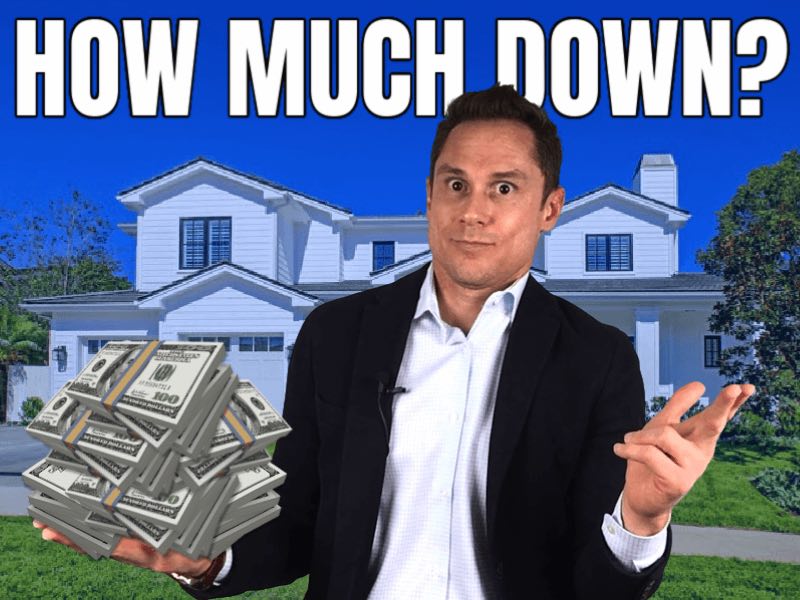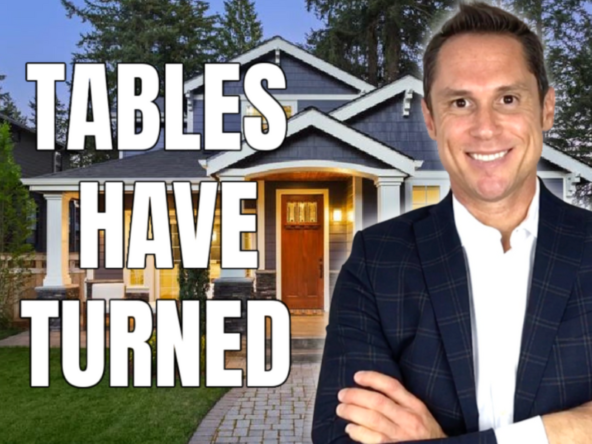Putting enough money together for a down payment to buy a house is the biggest obstacle for most home buyers. How much do you really need? How much is a down payment on a house?
Most people try to save up as much as they can for a big down payment. However, the days of most people making a 20% down payment are over.
In fact, the research shows it’s about half of that. According to the National Association of Realtors’ most recent studies, the average down payment was 12% for all home buyers. First-time homebuyers put an average of 7% down and repeat buyers put down an average of about 16 percent.
So the question is how much of a down payment do you need for a house?
The answer to that question depends on many things. Including your income, credit, and how much you’ve been able to save to buy a house up to this point.
False Impressions About Down Payments
There are a lot of false impressions around the topic of down payments. Due to traditional mainstream thinking, many people think down payment requirements are much higher than they are.
At one point, 20% of a home’s value was the typical down payment required. However, home prices are so high now that 20% is out of most people’s reach. To say you need to put 20% down for a house now is just not true.
There are now several loan options available to buy a house for a lot less than 20% down, much less. The amount of down payment required is going to depend on the type of loan you get. So let’s take a look at the different loan options.
Mortgage Programs and Down Payment Minimum Requirements
Here are the most common home loan programs and their minimum down payment requirements.
Conventional Loans – This is a standard home loan you’ll get when you apply online or go to your local bank or credit union. Most of the time, these loans have a fixed rate. Therefore the interest rate will stay the same for the duration of the loan. Provided you qualify, the minimum down payment requirement can be as low as 3%, which is doable for most homebuyers.
FHA Loans – These loans are backed by the Federal Housing Administration (FHA) and require a 3.5% minimum down payment. 3.5% is the minimum, you can obviously make a down payment of 5% or more if you’d like.
VA Loans – This type of loan is guaranteed by the U.S. Department of Veteran’s Affairs. These loans are for people in the military, veterans, and surviving spouses. They offer really low rates and there is no down payment required for those that are eligible. That’s right, zero money down.
This is probably the best loan program available. If there’s any group that deserves zero down and low-interest rates it’s those that have served in the U.S. military.
USDA Loans – These loans are guaranteed by the U.S. Department of Agriculture’s (USDA) Rural Development Program. Therefore, the property needs to be in a designated rural area and there are income restrictions.
Similar to a VA Loan there is no down payment required. You’ll obviously still have to pay for your closing costs, though.
To get these types of loans, you simply borrow from a regular lender and the FHA, VA, or USDA will back the loans.
Why All the Fuss About 20% Down?
It’s more favorable to lenders when you put 20% down because you have more skin in the game since you’re using more of your own money to buy a home instead of relying on more of the bank’s money. Therefore lenders will reward homebuyers with lower interest rates, in general, compared to buyers/borrowers that put less money down.
Even though you don’t have to put 20% down lenders still prefer it because it minimizes their risk. Lenders want to minimize their risk at all costs.
Should you default on your mortgage, the bank will still be able to sell your home and recuperate their money because you’ll have already paid down the value of the home by 20 percent.
Private Mortgage Insurance
On the other hand, if you can’t afford to put 20% down you’ll have to pay private mortgage insurance (PMI). PMI will increase your monthly payment.
Lenders require PMI for buyers that put less than 20% down when purchasing a home as a form of insurance.
In this case, if you fail to pay the lender back and you lose your home they still get paid through the private mortgage insurance.
Depending on the mortgage and size of your down payment, the loan term, and your credit score, the cost of PMI can range from 0.25% to 2% of the loan amount per year. Obviously the higher your risk, the higher the percentage will be.
Having PMI isn’t the end of the world because you can have it removed later on. Once you have 20% equity in your home from paying it down and/or market appreciation simply call the lender and let them know you’d like to cancel your PMI and they’ll help you do so.
It’s important to note, you’re going to have to take the initiative on this. The bank’s not going to call you to let you know you can stop paying them this extra money.
Since having PMI will increase your monthly payment, you might decide to put 20% down.
Is It Worth Putting 20% Down?
If you have the extra money and it’s not going to put you in a tough spot financially, you might want to consider making the investment of 20% to get the best loan terms.
Then there’s the other school of thought that says if interest rates are low you want to put as little money down as possible because you’ll be able to keep your money in your bank in case of an emergency or maybe you can invest that money somewhere else for a good return.
For example, if you’re buying an $800K home and the difference between 5 and 20 percent down is $120K, instead of tying all that money up in a house it might make more sense for you to invest it to grow your business and make more money in the long run or to put that money to work for you and invest it in the stock market.
When you put 20% down you’re viewed as a more favorable buyer to a seller, in general, compared to someone with less of a down payment.
Will putting less than 20% down decrease your chances of having your offer accepted in a competitive market?
It could! In general, many sellers believe you’re more likely to be approved for your loan to close escrow if you’re putting more down, but it’s not always true. A buyer with less of a down payment doesn’t necessarily mean they’re less qualified than a homebuyer with a larger down payment. So it’s important your agent communicates to the seller that you’re putting less down by choice and not out of necessity.
There are a lot of different opinions about how much of a down payment is the best. Ultimately you have to decide what you’re comfortable with.
It’s important to note, if putting 20% down is going to wipe you out financially it makes more sense to make a smaller down payment of 3, 5,10, or 15%. You obviously want to make sure you still have more than enough set aside to enjoy your home in comfort, pay for any unexpected home repairs, or any life emergencies.
Don’t Mistake Earnest Money Deposit for a Down Payment
When you get an offer accepted and open escrow, you’ll be required to transfer your earnest money deposit (EMD) to the escrow company. This shows the seller you are serious about buying the home and essentially takes your home off the market. However, this doesn’t preclude the seller from accepting back up offers if they choose to do so.
Sellers are going to expect to see an average of about 2-3% of the purchase price as the EMD.
It’s very common for buyers to mistake EMD for a down payment. They’re not the same thing. The down payment is how much of your money you’re paying toward the purchase price of the home, the rest is how much you’ll be financing through the lender. For example, if you’re putting 20% down the lender will be financing 80%.
Earnest money deposit is different. It’s a deposit that gets applied toward your down payment at the time of closing. For example, if you’re putting 20% down and you’ve already given your earnest money deposit of 3% to escrow you would need to pay the difference of 17% to close escrow plus any closing costs.
How Much Should You Put Down On A House?
Ultimately, you’re going to have to decide how much is right for you based on what we just covered and your own situation. Nobody knows or cares more about your finances than you do. Just don’t get caught up in the misconception that you need more than you really do because you don’t need to put 20% down if your finances are in line.
I can’t tell you how many people have put off purchasing real estate because they were relying on old information when they could have bought sooner if they were just informed.
If you know anybody that would benefit from this please share it with them. Who knows? It might change their lives and lead to them being a homeowner.





